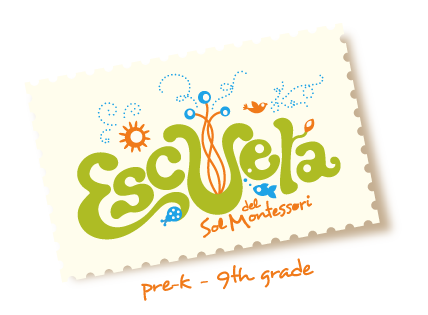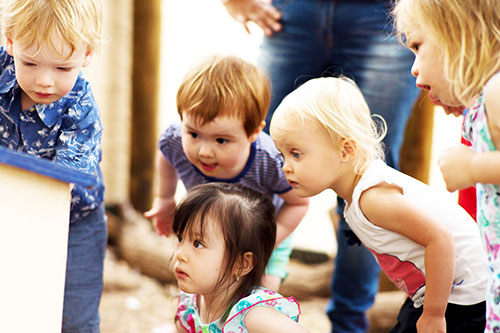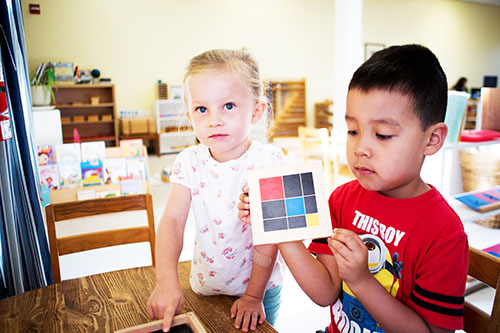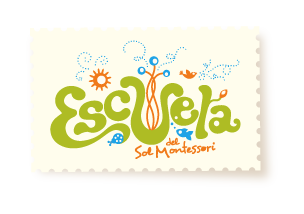One of the guiding principles of Montessori education is helping children to become independent. Freedom for students to choose classwork according to their interests and ability level is a core principle for any Montessori classroom. While this might cause people to picture chaos as they imagine a whole classroom of children moving in different directions all at once, Dr. Maria Montessori tells us this is not the case. In The Absorbent Mind, she states, “To let the child do as he likes when he has not yet developed any powers of control is to betray the idea of freedom.” (p.204) The key to a successful classroom is helping to guide children and establish careful limits, a careful balance of freedom and responsibility.
The Prepared Environment
Montessori learning environments are carefully designed to allow children the freedom to make choices, with lots of inspiration for exploration, and the materials to carry out this work responsibly. For this reason, we call our classrooms “prepared environments.”
Children are carefully guided by the adults in the classroom with precise lessons which introduce key concepts. Each material in the classroom, from a pencil to a complex math material, is introduced in a precise manner with careful guidelines. Most Montessori materials are designed to be self-correcting, so after an initial presentation, students are able to work on their own, exploring at their own pace and driven by personal interest. Over time, students have an increasingly wider array of choices for independent activity.
Students are able to direct their own learning, but not without limits and guidance. Montessori guides follow a comprehensive, graduated curriculum, introducing key lessons to children at the right time, based on careful observation. Adults may support young learners by giving them a limited choice in the beginning, such as “Would you like to choose an art activity or would you like to practice using the math material from yesterday’s lesson?” As children grow and are better able to manage their time, they have increasing freedom.
Self-Discipline and Responsibility
Another factor that makes independent choice successful is the development of self-discipline and responsibility. Learning to be one in a community of many individuals is a skill that begins in early childhood and develops throughout adolescence. In the Early Childhood classrooms, children are taught to return materials to their proper place, ready for the next person. Typically there is only one of each material, helping the children to learn to wait and take turns.
In Elementary, children begin to work collectively, learning to decide how each person will contribute to the task at hand. As children become increasingly aware of the needs of others, they develop greater social responsibility, and thus the social fabric of each community begins to function more smoothly.
As students approach adolescence, they begin to explore the roles of adulthood, and to delve more deeply into what it means to be part of a community. Dr. Montessori describes adolescents as “social newborns.” In the Center for Study and Work, the Prepared Environment for adolescents, students learn to support each other in an environment of deep collaboration. They cook for one another, garden together, manage the student-led business, and plan academic projects. They learn to work side-by-side with adult guides and community experts. Learning the social skills to function productively within a community is the kind of responsibility that balances student freedom. The boundary of one’s freedom is limited by its impact on the community.
Community guidelines are important at all levels of Montessori education. A common mantra is “Take care of yourself, take care of others, take care of the environment.“ These simple guidelines may be enough in the early childhood classrooms, but as students grow they begin to work together with the guides to create classroom guidelines. The adolescent community creates its own “Code of Conduct” each year as a community. At every level, conflicts are resolved through age-appropriate community meetings. Clear, consistent guidelines empower students to make choices.
Montessori in the Home
How does this principle apply at home? Dr. Montessori gives us some helpful advice. She tells us that children look to adults for guidance. Helping to set limits is an aid that we can give them as we learn to support our children in their quest for independence. When people have choice, they feel empowered to take charge of their own needs and this helps to develop confidence and a feeling of capability. When children have clear limits, they feel safe making those choices, knowing that the adults are watching out for their safety while also giving them boundaries.
How to support your child to develop freedom with responsibility:
- Provide extra time in your schedule to allow for choices. Early Childhood students, and adolescents in particular, may need more time to ponder choices. When possible, plan ahead.
- Use family meetings to create and review the guidelines of your household. Allow children to have input in creating the agreements they will follow. Let these guidelines be the limit of choice. For example, “In our house we agree to keep each other safe. Is this choice safe for everyone?”
- When children are learning to make choices, give a limited choice. Don’t compromise on things that are not negotiable. For example, “It’s time for bed. Would you like a story or a lullaby?” Children can choose how to go to bed, but not whether or not it’s bedtime.
- Help your children feel safe by being consistent. Children sometimes test limits in order to be safe. If your child resists an established rule, kindly and firmly restate the guideline. Making exceptions can be confusing and lead to more resistance to future guidelines.
Helping children to develop independence and responsibility is one of the best ways to support children. Maria Montessori said, “I have observed that the child, on condition that he is granted the freedom to work, learns, becomes cultured, absorbs knowledge and gains experiences that become embedded in his spirit. Like seeds planted in fertile ground, they soon germinate and bear fruit.” (Citizen of the World, p. 96)
For more information on how to hold family meetings check out this article from the Positive Discipline website:






